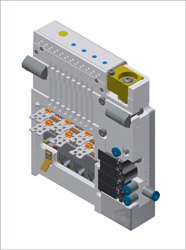
Posted to News on 17th Apr 2015, 16:23
Festo Didactic presents the CP Factory with the CPS Gate
Digitalisation gives companies increasingly better ways of generating and communicating data from all areas of their order and production systems in real time, using it in production to increase both efficiency and flexibility. The enormous rise in the quantity of data and the complexity of networking plant and company areas requires developing products that make the flow of data easy to conceptualise and handle.

The CPS Gate is a fundamentally enhanced, intelligent module for the communication of process data. It is used in the CP Factory - a cyber-physical research and learning factory, which represents different stations of a real production facility in model form. The purpose of the factory is to test and develop the technologies and methods used in digitalisation and network formation and taught to the skilled workers of the future at companies, universities and vocational colleges. The CPS Gate functions within the factory's work stations as the elementary module for controlling the processes. It communicates in the network with the connected IT systems (ERP) and the production management system (MES) as well as all production-relevant data of the products being processed.
It is fitted directly on the conveyor belt of the relevant workstation on a production line and uses an NFC antenna, an RFID antenna and an OPC-UA interface to pick up data from the workpiece, the MES and other IT systems, communicating it to workstation applications. In this respect, the CPS Gate takes over a large part of the production process controls and is used to structure and modularise the facilities. On a size of approx. 11 × 14 × 3 cm, the CPS Gate integrates a high-performance computer, an IEC 61131 V3-based control unit, a three-port switch, various sensors and interfaces as well as a printed circuit board; the latter replaces the majority of the standard cabling and configuration in a system module with digital technology and programming.
The CPS Gate also provides considerably enhanced structuring elements via handling by students and researchers: repeated yet complex data handling routines are developed once and outsourced to the CPS Gate as system firmware. This drastically reduces the complexity of the system software and increases the transparency of the system programs. The PLC programs for the value-creating workstations are easier to understand and service. A clearly defined interface between the CPS Gate and the assigned workstation enables even inexperienced students and programmers to develop station programs on their own, without having to survey and influence the entire function of an installation. By means of the CPS Gate's Codesys programming interface based on the IEC61131 V3 standard, the behaviour of the CPS Gate can be freely programmed in an object-oriented manner.
Further topics that can be trained with the CP Factory are energy monitoring and management, usage of smart devices and augmented reality applications in production, network communication, camera and sensor systems and data-based job controlling.
Festo Didactic presenting the CP Factory:
- Hall 15, Booth D07: Festo Group
- Hall 24, Booth B26/1: VDMA, Festo Didactic, Trebing + Himstedt
- Hall 7, Booth D04: SAP and Festo Didactic
- Hall 8, Booth D20: SmartFactory, Festo Didactic and further partners
The holistic approach by Festo Didactic for the qualification for Industry 4.0 is based on the rapid developments in digital technology. In the coming decades, the production and work processes in the automation sector will undergo considerable change in all company areas. Production and work processes can already be developed, simulated and optimised virtually today in a very realistic way. Based on CAD models and with the help of production data, it is possible to visualise material and energy flows, using them to intuitively understand production and work processes and to create production concepts flexibly.
Consumption data about air, water and electricity or the formation of emissions from production and building management can be used to develop intelligent energy usage concepts. Data, software and network technologies can be used in the operation, control and optimisation of production facilities in order to customise mass production, also optimising processes in a self-organised way. Production lines can be adapted both to orders at hand and customer-specific requirements. In addition, data generated by a company's decentralised order-processing systems will be transferred to a production facility's workstations. Within the production cycle, this data will be accessed by each product via RFID or NFC and used to initiate an individual production step as soon as it reaches the next workstation. In this way, a product can be produced to customer requirements just as efficiently as in conventional serial production.
In future, the production sequence can be automatically adapted in the production network to the urgency of incoming orders. In line with adaptive production, orders will also be continually adapted and communicated to the material purchasing and logistics systems. The operational network can therefore ensure the optimisation of the material and energy flow in the entire value-added chain.
Even the shift of energy consumption within the production system can be automated based on capacity and energy cost data. In the production of the future, training content will therefore be critical for mechatronics and engineers - content that links specialist knowledge from the fields of physics and mechanical engineering with content from the areas of IT, facility networking, data analysis and programming.
In digitalised production, only a few communication format standards have established themselves so far. Thus, if one wishes to network parts of production digitally, then components and network technologies must be defined that are compatible with the relevant interfaces, resulting in a stable IT and production system overall and ensuring an actual increase in efficiency. This requires a deep understanding in the composition and programming of digital networks, and it can be taught at training factories in universities, vocational colleges and industrial companies and combined with specialist training courses, too.
Festo Didactic is a provider of technical training facilities, and is a consultancy and education provider for the industrial sector. Go to www.festo.com to learn more.
Want the latest machine building news straight to your inbox? Become a MachineBuilding member for free today >>














